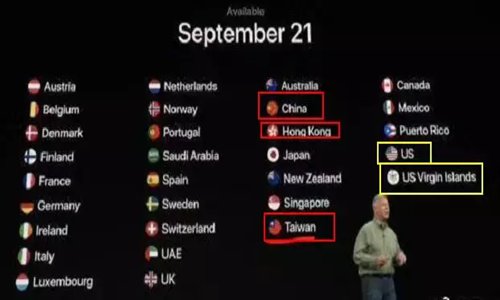
Screenshot from Apple's new product release on Wednesday. (Photo: Global Times)
Chinese netizens have called on Apple to abide by the one-China principle, after the company listed China, Hong Kong, and Taiwan separately on its latest new product release on Wednesday.
On the slide showing countries and regions where the new iPhone XS will appear on market next Friday, Hong Kong and Taiwan were listed on par with China, and Taiwan was separated from China and Hong Kong by three other countries.
Hong Kong and Taiwan are inalienable parts of China,which the United Nations recognizes.
Since the conference listed the US Virgin Islands on par with the US, Chinese netizens wonder why Apple could not place China in front of Hong Kong and Taiwan.
Apple users say this is not the first time that Apple violates the one-China principle. The built-in world clock of iPhones places China behind all mainland cities and Hong Kong. But Macao and Taipei are not listed this way.
"Multinationals like Apple usually lack the political consciousness in doing business, which may harm their own interests," said Li Haidong, a professor at the China Foreign Affairs University's Institute of International Relations.
"Foreign companies operating in China should respect China's basic line and Chinese customers," Li said. "Double standard in marking Chinese territory will harm the brand image of these enterprises."
Apple is not the first multinational company to adopt such a double standard. Ikea, referring to Taiwan the same way as China and other countries, caused similar disputes in August.
Earlier this year several aviation companies including American Airlines received letters urging the airlines to change their incorrect reference to Taiwan, Hong Kong and Macao.
"We welcome foreign companies to invest in China. But they should respect China's sovereignty and territorial integrity, abide by Chinese laws, and respect Chinese people's feelings," Foreign Ministry spokesperson Lu Kang said on a news briefing in June.


